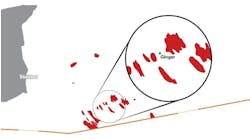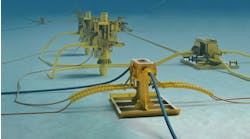Offshore staff
HOUSTON – Wood Mackenzie has analyzed the performance of corporates in the oil and gas industry.
Results suggest that following tighter cash flow management, 56 of the companies covered will achieve cash flow neutrality this year at an average oil price of around $50/bbl Brent.
Tom Ellacott, senior vice president of corporate research at Wood Mackenzie, said: “This is some achievement given the majority needed over $90/bbl in 2014.
“A growing list of companies will even be free cash flow neutral below $40/bbl in 2016,” he claimed.
However, they have attained this position mainly through heavy reductions in capital vestment and these have damaged growth prospects, he suggested. The 56 companies have cut 2016 their E&P spend by 49% or $230 billion relative to 2014 levels.
The aggregate five-year compound annual growth rate (CAGR) for production has fallen from 3.4% at peak in 2014 to only 1.4% in 2Q 2016, with those most affected being US independents.
Only four companies will probably grow at double-digit rates between 2015 and 2020, the analysis found. Leading the way isLundin Petroleum, the Swedish independent with a stake in the Johan Sverdrup oil development, with 31% growth prospects.
At the other end of the spectrum, nearly 30 companies will be producing less in 2020 than in 2015.
The 56 companies have cut payouts to their shareholders by $59 billion since the oil price collapse, while some have issued equity or targeted asset sales to bolster their finances.
“Balance sheet management is front of mind across the industry – cost containment and capital discipline are still the strident messages emanating from all companies,” Ellacott said. “But strategies will need to shift away from survival mode and look to the future.”
A return to free cash flow generation will breathe confidence back into the sector, the report found, whilecosts are falling and project economics improving as the industry adjusts to operations at lower prices.
Ellacott added that smarter capital allocation and efforts to rework projects to reduce costs are also starting to pay off.
“But it is too early to call the start of the next investment cycle, despite some recent high profile project sanctions. Many next-generation projects still fall short of tougher economic screening criteria, particularly indeepwater.”
“In the 2Q 2016 results season we’ll be looking for signs of more progress in driving down costs as companies re-engineer developments.”
07/26/2016
Share your news withOffshore at [email protected]


